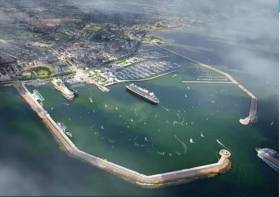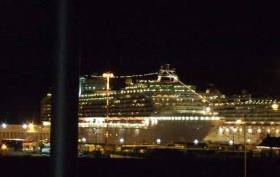Displaying items by tag: cruise ship
In a further twist in the long running proposed cruise Line berth at Dun Laoghaire Harbour, An Bord Pleanála has written to Dun Laoghaire Harbour Company this week requesting them to furnish further information in relation to the effects on the environment of the proposed development. The board is also seeking further technical and scientific information on the project.
In effect, it means the board is still not in a position to make its determination on the Cruise Ship Project for the Dublin Bay Harbour that this week also saw its transfer into Council ownership move a step closer.
As regular Afloat.ie readers will know, a year ago Dún Laoghaire Harbour Company (DLHC) issued a statement on its cruise berth facility following a court case decision in which environmental lobby group Save our Seafront, chaired by local TD Richard Boyd Barrett, 'won its legal action against the decision to grant planning permission for the Dún Laoghaire Cruise Terminal'.
This week's An Bord Pleanála request has drawn a swift response from Independent Senator, Victor Boyhan, who has expressed his concerns about the capacity of An Bord Pleanála to 'deliver planning decisions in a timely manner'.
“In particular, I am concerned by its handling of the Dún Laoghaire Harbour cruise ship terminal project. A controversial development, by Dún Laoghaire Harbour Company, which has proven to be a very divisive project.”
“An Bord Pleanála received more than 150 objections to the project and it was expected that it would announce its decision to grant, amend or refuse planning permission for the development in Dún Laoghaire Harbour by 8 January 2016.”
“It further extended the decision date to April and thereafter extended it again this time to 17 June 2016.”
“Local residents and harbour users who paid fees to engaged in the planning appeals process are frustrated by the inordinate delays, in what is supposed to be a ‘fast-track’ planning process.”
“In recent days, an Bord Pleanála ( Ref: 06D.PA0051 ( PA0042) 7th March 2018, has confirmed that it is still not in a position to make its determination on the Cruise Ship Project and has written to Dun Laoghaire Harbour Company requesting them to furnish further information in relation to the effects on the environment of the proposed development the board is also seeking further technical and scientific information on the project.”
“I am calling on An Bord Pleanála to explain why it has failed to reach a decision on the controversial proposal within the initial 18-week timeframe objective set by the board and to give reasons for the ongoing delays in this particular planning saga.”
“The government expanded the remit of an Bord Pleanála to fast-track certain planning projects, this planning application case highlights the need for a new and more professional approach to deal with planning appeals.”
Boyhan says the case highlighted the need for a total review of the boards capacity to achieved its own planning timelines and targets.
Coloured Cruise Ship Lights Creating Navigation Problems
The deck lights used by cruise ships have been identified as a potential navigation risk at sea at night, in the investigation of a complaint by a yacht Skipper following an encounter with a cruise vessel, writes Tom MacSweeney.
It was investigated by the CHIRP Maritime organisation, the British (UK) Confidential Reporting Programme for Maritime incidents. The aim of CHIRP is to contribute to the enhancement of maritime safety worldwide. It says that it provides “a totally independent confidential (not anonymous) reporting system for all individuals employed in the maritime industry. It provides a similar aviation system.
The yacht Skipper reported to CHRIP that it was difficult to distinguish navigation lights amongst other deck lights:
“I was under sail in a Southerly direction when I saw the lights of another vessel off my starboard bow.” Endeavouring to keep clear “the relative tracks didn’t seem, to make sense if I was seeing what I thought was a green starboard navigation light.”
The vessel was a cruise ship which crossed a mile ahead, going from East to West.
“I should therefore, have been able to see the port navigation light, but could not convince myself there was a red light amongst the multitude of other lights visible on the cruise liner.”
As the vessels were both a safe distance from each other, there was no harm, but the amount of coloured lights on cruise ships has been identified as an issue needing attention.
The yacht Skipper said: “The Collision Regulations specify the minimum visibility of navigation lights. However, the impact of other bright lights, obscuring the navigation lights, is not appreciated. Vessels should ensure that their navigation lights are bright enough to be seen against the background of all their other lights and avoid using coloured deck lights where this can cause confusion. Very bright deck working lights obscuring navigation lights are often an issue on fishing boats as well.”
The CHIRP investigation comment said: “The Maritime Advisory Board highlighted the importance of taking a series of compass bearings in order to determine whether a risk of collision exists Navigation light visibility, irrespective of other lighting, must comply with COL REGS.
“They queried why classification societies permit these designs where visibility is obscured. Technology exists whereby deck lighting may be adequately shaded – permitting safe movement on board, yet not obscuring regulatory lights. The quality of lights bulbs used is another possible consideration. Take LED for example – are approved suppliers holding the introduction of these back due to a lack of any requirement in COLREGS?”
Irish Couple Speak of 'Titanic' Experience on Capsized Cruise Liner
#NEWS UPDATE - The Irish couple rescued from the stricken cruise liner off the Italian coast have spoken of their joy to be back home safe and sound.
Séamus Moore (52) and his wife Carol (50) from Clonmel were greeted by their three children at Dublin Airport yesterday, just two days after the Costa Concordia struck a sandbank and capsized off Tuscany.
“It was a difficult experience but at the end of the day it worked out very well for most people," Carol told The Irish Times. "It’s really, really a relief to be home.”
Commenting on the events of Friday night, Séamus likened their experiences on the sinking cruise ship to the film Titanic.
“When we were sitting on the side of the ship I said to her ‘now we know what Leonardo DiCaprio and Kate Winslett felt like’ and she said ‘well at least Kate lived’."
As the boat listed, it also struck Séamus that while "everything was crashing one way, then the next, the one thing I did notice is that the piano player kept playing."
The couple were removed from the ship by lifeboat in the early hours of Saturday and looked after by the staff at the Irish Embassy in Rome before their return.
They were among some 4,000 passengers on the cruise ship, most of whom were rescued within hours of the incident. Six people are confirmed dead following the disaster, with more than 60 injured and 16 people still missing.
The captain of the 114,500-tonne vessel was arrested on Saturday accused of manslaughter and of abandoning ship before all passengers and crew had been evaculated.
The Irish Times has more on the story HERE.
Irish Couple Among the Rescued from Capsized Cruise Ship in Italy
#NEWS UPDATE - An Irish couple were among those rescued from the cruise ship that ran aground off the coast of Italy on Friday night, the Irish Examiner reports.
Three people are believed to have died, while 14 others were injured, after the Costa Concordia struck a sandbank and capsized off the Tuscan coastline in the Tyrrhenian Sea.
The vessel was carrying more than 4,000 passengers at the time, many of whom jumped into the water as panic set in after the ship hit a rock that tore a 150ft gash in the hull.
As of Saturday three bodies had been recovered from the sea, with at least three more feared drowned.
The Department of Foreign Affairs confirmed that an Irish couple on board are safe and well, and are receiving consular assistance. Many survivors are taking refuge on the small island of Giglio close to the incident.
The Irish Examiner has more on the story HERE.

































































